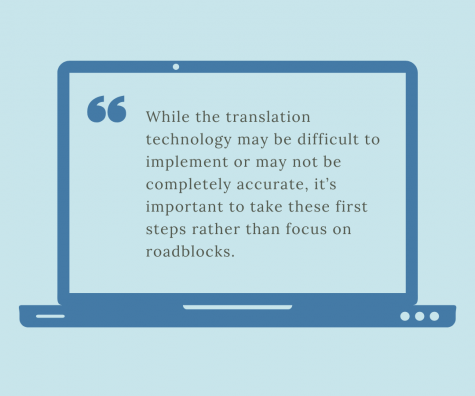An English-centered Internet causes miscommunication, misinformation and isolation
Examining how English being the Internet’s primary language affects users
February 2, 2022
As billions of people from various cultures and backgrounds use the internet every day, digital language diversity continues to grow. Despite this, English still functions as the internet’s primary language with over 25.9% digital content in English as of January 2020, and Chinese coming in second at 19.4%.
There are some benefits to using English as a universal language — it sets a worldwide standard for communication, and doesn’t require users to learn multiple languages or use translation technology.
However, despite these positives, having primarily English-centered media discourages the use and understanding of other languages. In a time when much of people’s lives revolve around the internet, a lack of content in other languages causes them to fade and in extreme cases, leads to digital language death — especially with smaller languages or those that don’t have a written form.
Additionally, when we regard English as the norm, cultural nuances are often lost in translation. For example, in August of 2020, a USC professor stepped down after students mistook his use of the Mandarin phrase, 那个 (pronounced na-ge or nei-ge), for the n-word and filed complaints.
These types of incidents stem from the misunderstanding of unfamiliar languages and can lead to an increase in xenophobia and negative perceptions of other cultures. Because we see English as the standard, it’s easy to twist other languages to fit our Westernized narrative and forget that there are different norms in other cultures.
Another detriment is that English-centered media promotes misinformation among non-native English speakers. Since people who aren’t fluent in English have access to fewer resources, they are often unable to understand what is going on in the world and form opinions on important events. These barriers can inhibit their ability to contribute to important events, like government elections.
As a result, communities of non-native English speakers form echo chambers, where beliefs are repeated and reinforced without outside information to provide opposing views. The lack of regulation allows any misinformation in these communities to grow.
According to NPR news, Facebook flagged about 70% of inaccurate posts in English but only 30% of Spanish posts. These echo chambers only serve to amplify this misinformation in non-English speaking communities, making the spread of fake news even more prevalent.
A lack of language diversity affects the MVHS community as well, as many students come from immigrant families. Despite the fact that MVHS consists of a variety of racial groups, with the largest group being Asian-Indians, district-wide and school-wide emails are only sent in Mandarin, Spanish and English. As a result, families who aren’t fluent in these three languages may not understand the messages and miss out on important information.
 To combat this, MVHS and FUHSD administration should work with native speakers of certain languages to translate emails and information going out. Although there will be languages that are more niche, there should be no excuse for languages of larger communities, as it’s entirely possible to find people willing to help. Another way to deal with language barriers could be including translation options in important emails that allow readers to view the content in their native language. While the translation technology may be difficult to implement or may not be completely accurate, it’s important to take these first steps rather than focus on roadblocks.
To combat this, MVHS and FUHSD administration should work with native speakers of certain languages to translate emails and information going out. Although there will be languages that are more niche, there should be no excuse for languages of larger communities, as it’s entirely possible to find people willing to help. Another way to deal with language barriers could be including translation options in important emails that allow readers to view the content in their native language. While the translation technology may be difficult to implement or may not be completely accurate, it’s important to take these first steps rather than focus on roadblocks.
Ultimately, the internet’s language no longer reflects its diverse user demographic, to the detriment of many internet users. It’s important to learn about and understand the language demographics for our communities and adjust accordingly. The languages of the internet should reflect the languages of its users to maintain diversity and promote better communication.
This story was originally published on El Estoque on December 10, 2021.




































